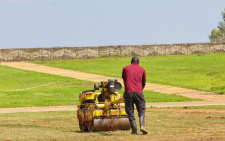The National Biosafety Authority (NBA) has announced plans to establish three new regional offices as part of its efforts to enhance oversight of genetically modified organisms (GMOs) and their derived products.
The new offices will be set up in Malaba (Busia county), Lunga Lunga (Kwale county) and Holili (Taita Taveta county). Currently, the NBA operates regional offices in Mombasa, Busia, and Namanga.
Acting Chief Executive Officer Nehemiah Ngetich revealed this during a session with students from the National Defence College, emphasising the Authority’s commitment to ensuring that no GMOs enter Kenya without proper approval.
“We are going to engage apparatus in dealing with importers and dealers of GMOs and their derived product who violate the law,” said Ngetich.
He also highlighted the need for additional resources to staff the country’s 24 entry points effectively, requiring at least 48 officers. He warned that importers and dealers violating GMO regulations would face strict enforcement measures.
“Food security is a national security issue because it is a primary responsibility of the government to protect its citizens from all threats, including food insecurity. The Authority role is on facilitating approvals of safe biotech crops, animal breeds that are resistant to pests and diseases that lead to increased food production,” Ngetich stated.
Court ruling
He also noted the NBA’s critical role in approving safe biotech crops and animal breeds to enhance food production and economic stability.
This latest decision comes just a month after the lifting of a long-standing ban on GMOs, reaffirmed by a High Court ruling.
The agency is also seeking a review of the Biosafety Act to include emerging technologies such as genome editing, gene-drive technologies, synthetic biology, and biosecurity applications. These updates aim to keep Kenya at the forefront of global biosafety standards while addressing public concerns.
Kenya’s regulatory framework aligns with the Cartagena Protocol on Biosafety, a multilateral agreement ensuring safe GMO handling. Nationally, Kenya has established a robust legal framework, including the National Biotechnology Development Policy (2006), the Biosafety Act (2009), and subsequent regulations on GMO use, import, export, and labelling.
Major-General Y.S. Abdi, leading the National Defence College delegation, commended the agency’s efforts in public education and fostering informed consumer choices. “The NBA’s work fits well within the government’s Bottom-Up Economic Transformation Agenda, particularly in driving agricultural transformation and inclusive growth,” he said.



















